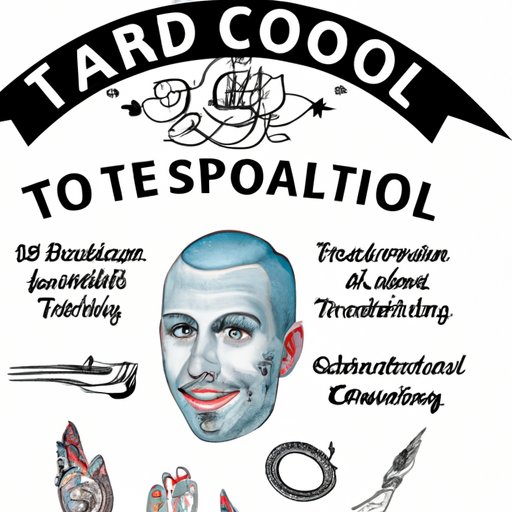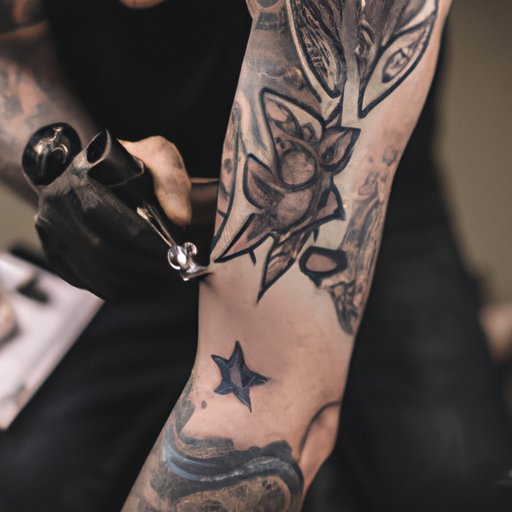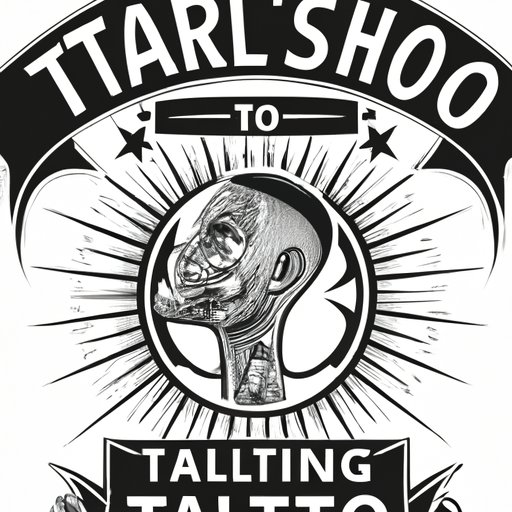Introduction
The art of tattooing has been around for centuries, but it has recently seen a surge in popularity with many people looking to express themselves through body art. If you’re interested in becoming a professional tattoo artist, there are important skills and qualifications you need to understand before you take the plunge. This article will explore what it takes to become a successful tattoo artist and the various considerations you should be aware of.

Essential Skills and Qualifications to Become a Tattoo Artist
In order to become a successful tattoo artist, you must have a combination of artistic and technical skills. You must also meet the licensing requirements set by your state or local government. Let’s explore each of these in more detail.
Artistic Skills
As a tattoo artist, you must have a good understanding of color theory and composition. You should also have an eye for detail and be able to draw complex designs. It is important to have an understanding of the fundamentals of art such as perspective, shading, and line work. Additionally, you should possess an understanding of tattoo styles and trends so that you can create unique pieces of art that customers will appreciate.
Technical Skills
In addition to artistic skills, you must also have a good understanding of the technical aspects of tattooing. This includes an understanding of the equipment used and how to safely operate it. You should also have knowledge of sterilization and hygiene practices to ensure the safety of your customers. Finally, you must have excellent communication skills in order to effectively communicate with customers and discuss their ideas.
Licensing Requirements
In most states, you will need to obtain a license in order to practice tattooing. The requirements vary from state to state, but generally include proof of education, passing a written exam, and completing an apprenticeship. You may also need to provide proof of medical training and pass a background check. It is important to check with your local government to find out the specific requirements in your area.
Steps to Becoming a Professional Tattoo Artist
Once you have the necessary skills and qualifications, there are several steps you must take in order to become a professional tattoo artist. These include education, apprenticeship, and building your clientele.
Education
You don’t need a formal education in order to become a tattoo artist, but having some knowledge of art and design can be beneficial. Taking classes in art, drawing, and painting can help you develop the skills you need to become a successful tattoo artist. You may also consider taking classes in business and customer service, as these skills will be important when running your own shop.
Apprenticeship
In order to gain experience and hone your skills, you should complete an apprenticeship under an experienced tattoo artist. During this time, you will learn the fundamentals of tattooing, such as how to use the equipment, how to mix ink, and how to create custom designs. You will also gain valuable insight into the business side of tattooing, such as how to interact with customers and how to market yourself.
Building Your Clientele
After completing your apprenticeship, you should start building your clientele. Networking with other tattoo artists and attending conventions and trade shows can help you get your name out there. You should also create a portfolio of your work and promote it on social media and your website. Word of mouth is also a great way to attract new clients.

Financial Requirements of Opening a Tattoo Shop
Once you have built up your clientele, you may decide to open your own tattoo shop. There are certain financial requirements you must consider before taking this step.
Start-up Costs
Opening a tattoo shop requires a significant investment. You will need to purchase the necessary equipment such as tattoo machines, needles, and ink. You will also need to lease a space and cover any renovation costs. Finally, you may need to hire additional staff, depending on the size of your shop.
Ongoing Expenses
In addition to the initial start-up costs, you will also need to consider ongoing expenses such as rent, utilities, supplies, and insurance. You should also factor in the cost of advertising, as this is essential for attracting new customers.

Benefits and Drawbacks of Working as a Tattoo Artist
Working as a tattoo artist has its advantages and disadvantages. Here are some of the key benefits and drawbacks to consider.
Benefits
One of the main benefits of working as a tattoo artist is the creative freedom it offers. You will have the opportunity to express yourself through your art and create unique designs for your clients. You will also have the satisfaction of knowing that you are providing a service that makes people feel good about themselves. Finally, you can make a decent living from your art if you are successful.
Drawbacks
One of the drawbacks of being a tattoo artist is the long hours. You may find yourself working late nights and weekends in order to accommodate your clients. You will also be exposed to blood and other bodily fluids, so you must take proper safety precautions. Finally, there is always the risk of making a mistake, which could lead to dissatisfied customers.
Different Types of Tattoo Styles and Techniques
There are many different styles and techniques used in tattooing. Here are some of the most popular.
Traditional Tattoos
Traditional tattoos are characterized by bold lines and bright colors. They often feature iconic imagery such as skulls, animals, and flowers. Traditional tattoos have a long history and are still popular today.
Blackwork Tattoos
Blackwork tattoos are created using only black ink and are often used to create geometric patterns or abstract designs. They are popular among those looking for a minimalist design.
Realism Tattoos
Realism tattoos are highly detailed and seek to recreate a realistic image. They often feature portraits of people or animals and require a high level of skill to execute properly.
Watercolor Tattoos
Watercolor tattoos are characterized by soft colors and fluid lines. They often feature dreamy landscapes or abstract designs.
Local Regulations for Operating a Tattoo Business
Before opening your own tattoo shop, you must familiarize yourself with the local regulations in your area. These regulations typically relate to health and safety, zoning, and noise restrictions.
Health and Safety Regulations
Your local government may have regulations regarding health and safety in tattoo shops. This may include requirements for sterilizing equipment and disposing of needles, as well as enforcing safety standards for employees and customers.
Zoning Regulations
You must also ensure that your shop meets the zoning regulations in your area. This may include restrictions on the type of building you can use and the distance you must be from schools, churches, and other public places.

Marketing Yourself as a Tattoo Artist
Once you have opened your shop, you must focus on marketing yourself in order to attract new customers. Here are some tips for getting started.
Networking
Networking is essential for any business, and it is especially important for tattoo artists. Attend conventions and trade shows to meet other professionals in the industry. You should also join local organizations and participate in community events.
Social Media
Social media is a great way to reach potential customers. Create accounts on platforms such as Instagram and Facebook and post regularly to showcase your work. You should also engage with other users and respond to comments.
Creating a Website
Having a website is a great way to reach even more customers. Include your portfolio, contact information, and any other relevant information about your shop. You should also include a blog to share more about your work and keep customers up to date.
Conclusion
Becoming a successful tattoo artist requires a combination of artistic and technical skills, as well as meeting the licensing requirements in your area. You must also complete an apprenticeship, build your clientele, and consider the financial requirements of opening a shop. You should also be aware of the benefits and drawbacks of working as a tattoo artist, the different types of tattoo styles and techniques, and the local regulations for operating a tattoo business. Finally, you must focus on marketing yourself in order to attract new customers.
(Note: Is this article not meeting your expectations? Do you have knowledge or insights to share? Unlock new opportunities and expand your reach by joining our authors team. Click Registration to join us and share your expertise with our readers.)
